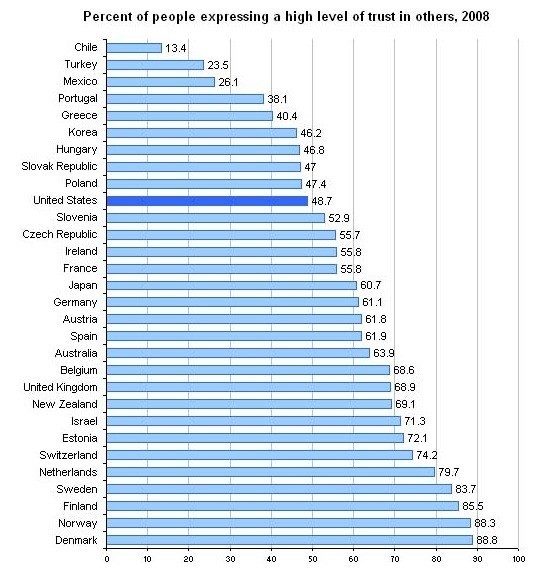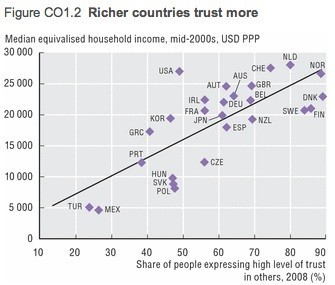People living in richer, more egalitarian countries trust their fellow human beings more, new data shows.
Countries with high median household incomes are more trusting, generally, than countries with lower income levels. The United States is an exception to this trend.
The Organization for Economic Cooperation and Development surveyed 30 industrialized countries with the question, "Generally speaking would you say that most people can be trusted or that you need to be very careful in dealing with people?" Danes are the most trusting people and Chileans the least, according to the data.
In 2008, the United States was the 10th least trusting country, with only 48.7 percent of Americans responding that, generally speaking, most people could be trusted. But, of the countries surveyed, the U.S. ranks fourth for median household income levels.

The O.E.C.D.'s data also shows that higher levels of trust are strongly associated with lower levels of income inequality.
The analysis from the O.E.C.D. does not draw definite conclusions about the cause and effect relationship between wealth and trust. "Trust may promote gainful economic activity, or trust may be a luxury affordable only by richer countries," the report notes.
Likewise, the relationship between inequality and trust is left open by the report, which surmises that income inequality may make it more difficult for people to share a sense of common purpose, or it may be that low levels of trust inhibit positive social bonds, which could lead to more inequality in society.
The data from the O.E.C.D. correlates with what academics have thought for a long time: Money and trust are integrally bound together.
Tom W. Smith, the director of the Center for the Study of Politics and Society at the University of Chicago, who has written about trust and confidence in institutions, teases out some of the connections.
"If you have a higher income and you're substantially above the poverty line, you have more of a margin of generosity. You can be a little more trusting, a little more generous to others. You have this margin where you can be open to others," Smith said. "But if you're at or below the poverty level, there's no margin. You can't be generous towards others because there's nothing you could possible give up."
But many academics who study the relationship between wealth and trust argue that a country's income inequality is far more important than the overall wealth of a country.
"Inequality is much more significant than wealth and the reason is that trust reflects the view that what happens to me happens to you. That we're all in this together. And inequality works exactly to counter that," said Eric M. Uslaner, professor of government and politics at the University of Maryland-College Park, whose research focuses on the reasons people trust each other.
Uslaner also noted that it was important to take the percentages from the O.E.C.D. with a grain of salt. Although the general order of the list did not surprise him -- Nordic countries are always ranked as the most trusting in the world -- the percentages of people expressing a high level of trust in others seemed high to him, across the board.
"I have never seen numbers of generalized trust like that. In virtually any other survey I have ever seen on trust, there are five countries that have trust levels above 50 percent. The Nordic countries always fall into that range. Sometimes Canada, sometimes Australia. So 88 percent is absolutely unheard of," Uslaner said.
According to the, O.E.C.D. 88.8 percent of Denmark's population has a high level of trust. According to figures Uslaner references from the World Values Survey from 1995 (the most trustworthy source in his view), 58 percent of Danes are trusting, while only 36 percent of Americans think other people can be trusted.
Data from the General Social Survey, which conducts annual scientific research on the structure of American society, corresponds closely with the World Values Survey -- the percentage of trusting Americans in the past decade has never risen above 38 percent. Although the GSS does show a decline from 1972, when 47 percent of Americans said that people could be trusted.
The reason for the United States' relatively low trust level given its high GDP is clear, academics say: high income inequality.

"The United States has one of the highest levels of inequality of any industrial countries in the world. It's created a great deal of mistrust in everything," said Brian Vargus, professor of political science at Indiana University-Purdue University Indianapolis who specializes in trust and the government.
The Great Recession has made income inequality in the United States worse, as corporate profits have rebounded while unemployment remains high. On Tuesday, a new study by the nation's largest labor union found that CEOs at 299 U.S. companies earned $3.4 billion combined in executive compensation in 2010. In all, CEO compensation equalled the combined average earnings of more than 100,000 workers in their respective companies.
"People are now talking in the United States about the economy going in two different directions. If you're really rich, it's a great time to be an American; if you're middle class or poor, it's a terrible time," Uslaner said. "It's not surprising that people don't feel this common sense of identity."
Of the 30 countries surveyed by O.E.C.D., most became slightly more trustful over the last decade. The United States was one of six of the 30 countries surveyed that showed a decline in trust. Change in a country's level of trust over time is unusual, academics say, and one of the few things that can alter it is a change in income inequality.
"Trust is extremely sticky -- it doesn't change. And it doesn't change over a course of a person's lifetime that much either. Nor does inequality change that much over time" Uslaner said. "But there is a vicious cycle that many countries get themselves into, with high levels of inequality leading to low levels of trust leading to high levels of corruption which lead to even higher levels of inequality and lower levels of trust. It becomes extraordinarily difficult to break this chain."
Brian Vargus, and others who study the sociology of trust see a strong correlation between high levels of trust -- both between people as well as an individual's trust in institutions -- and a well run government.
"The feeling is, when you look at trust and you see how it moves across government, as people become more mistrustful of government, it's much more difficult to govern," Vargus said. "As trust levels go up, it can help foster better economic relations, but when you've got an economic downturn, high unemployment, the public starts asking, who can I trust?"
Furthermore, Tom Smith notes, mistrust, particularly mistrust based in poverty, has a way of passing down through generations.
"If your parents teach you not to trust others, then you grow up with those values and you're likely to pass along those values to your children. so this kind of culture perpetuates itself," Smith said.
